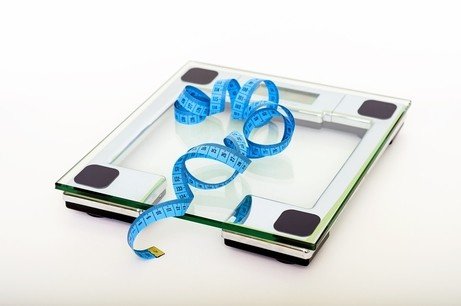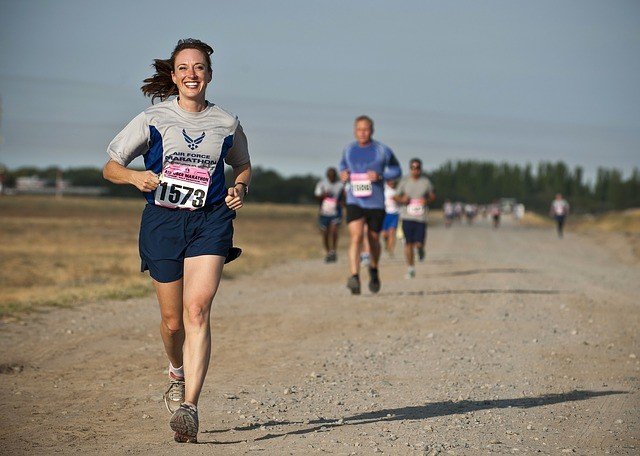Why Losing Weight is Theoretically Simple but Frustratingly Hard

The Two Steps of Fat Loss
Do you want to lose body fat and get lean? In this post I will explain exactly how to lose body fat in two simple steps that anyone can follow.
Step 1: Be in a caloric deficit
Step 2: Repeat Step 1 until you achieve desired fat loss
That’s it. There’s no magic. No secret. No quick fix. No super food or detox or special exercise.
How to Do Step 1

Step 1 is easy in principle. To get in a calorie deficit all you have to do is eat less or move more.
A simple (but also deceptively difficult) way to do Step 1 is to do the following:
- Download the app My Fitness Pal
- Plugin your height, weight, and activity level
- Set goal to "maintain weight"
- Eat less calories than your maintenance calories
- Lose weight
(4) is obviously the difficult part. To eat less calories you either have to be very in tune with your hunger and satiety signals, or you have to be a diligent calorie tracker. Accurately estimating caloric intake even with the help of My Fitness Pal can be a challenge.
Why Step 2 is the Hard Part

While Step 1 is hard enough, Step 2 (managing being in a deficit for months) is when you really starting riding the struggle bus because the key to either losing weight or getting shredded is to make being in a calorie deficit sustainable for months, maybe years.
Therein lies the rub. If you are in a calorie deficit for a sustained period of time you are probably going to be hungry and slightly miserable.
Being in a deficit for months at a time sucks.
So the key to Step 2 is to make it such that your hunger or satiation is manageable for months if not years. People often turn to low carb diets for this purpose because filling up on fats and protein tends to keep the hunger pains manageable while you are in a calorie deficit. But what you eat (low-carb vs high-carb) is less important for body recomposition than the caloric balance. The International Society of Sports Nutrition (ISSN) recently came out with a position paper on this topic, stating:
The ISSN has concluded the following. 1) There is a multitude of diet types and eating styles, whereby numerous subtypes fall under each major dietary archetype. 2) All body composition assessment methods have strengths and limitations. 3) Diets primarily focused on fat loss are driven by a sustained caloric deficit.
The other thing that happens in a sustained calorie deficit is that your metabolism adapts to being in a deficit and makes it harder and harder to maintain Step 2. It will slow down your metabolism and it will increase your appetite. Your body was designed by evolutionary processes to make it easy to gain weight and hard to lose weight.
This makes perfect adaptive sense in an environment where food was hard to come by and you had to burn a lot of calories gathering or hunting food. Now we can walk down to the local gasmart and buy thousands of calories for a few bucks with very little calorie expenditure.
So the very metabolic adaptations that once made it easier for us to survive are now helping contribute to a health epidemic. The freshman 15 is actually just the starting point for the Western tendency to get a little bit fatter every year.
What can we do to fight metabolic adaptation?
Because of this very real metabolic adaptation it’s critical to take intermittent “diet breaks” or “refeeds” to reset our metabolism. There’s a whole art and science to this.
The Yo-yo Diet Phenomenon

The nature of this adaptation makes it almost inevitable that people will yo-yo diet in and out of Step 2. They will be in a calorie deficit for a week or two, lose a few pounds (mostly water weight anyway). Then they get stressed or go out to eat with their friends, get tipsy, and stop at Taco Bell on the way home to devour a 1000 calorie meal along with 3 large sodas. Then the next day they feel like shit, and just give up on the diet altogether because they already "ruined it" last night.
The drunchies are real. Temptations are real. Eating is often a coping mechanism for stress and life in the 21st century is not without its stress.
Not all of us have the drive or motivation necessary to be in a caloric deficit for weeks and months. We are not robots. And we are genetically programmed to eat the food we have available to us. There's a reason we gain so much weight over the holidays: there is yummie calorie dense food everywhere.
We have snacks in the house, start a movie, and feel like it’d be freaking awesome to munch our way through the entire movie - and sometimes we can do this kind of eating behavior very automatically e.g. just randomly getting up and walking to the kitchen, finding yourself in the action, then saying "fuck it, I'm already in the kitchen might as well open the fridge and get something to eat."
Then we have a huge dinner and later icecream at 11pm because “we had a long day and we deserve it”. The realities of our modern food environment make it such that we have to avoid temptation all day long. You’ve been doing awesome with your calories that day but then Carol from work brings in donuts from your favorite local gourmet donut shop. What do you do? You eat one. Then another. Then 3 hours later you sneak back in to see if there’s more left.
Not to mention how hard to is to even determine accurately whether you are in a calorie deficit since tracking calories is notoriously difficult. Nutrition labels are inaccurate, digestion absorption rates are variable, individual differences abound, and weighing out food precisely is a pain in the ass. Not to mention it’s difficult to sustain the habit of calorie counting for the months and years necessary to get shredded.
So the odds are stacked against you getting lean, let alone in 12 weeks like so many personal trainers promise. If it was easy to get shredded abs everyone would have them.
Dieting is Hard

You have to want it. Really bad. So bad that you are willing to sacrifice your social life and earn the scorn of your family, friends, and co-workers. You have to become that “fitness person” in the social circle who actually gives a damn about the caloric content of what you're eating.
But the good news is that the principles behind getting lean are absolutely basic and easy to follow: get in a calorie deficit and stay there. But the devil is in the details. One such detail is the importance of developing and retaining muscle mass through strength training.
The importance of resistance training

If you just starve yourself and/or do cardio all day you’re going to lose a lot of muscle along with fat which will slowly make it harder and harder to maintain the calorie deficit because your metabolism will be shit. Not to mention most people in my opinion look better with less fat and more muscle. There are certainly health benefits to losing excess body fat but let's not kid ourselves: who doesn't want to look better in the process?
So we not only have to be on point with our nutrition to lose weight we have to find the time in our busy days to consistently hit the gym or workout for months or years if we want to be most effective in achieving our goals.
It’s hard work. Real hard. Especially maintaining it. A lot of people use unsustainable methods to lose weight and then wonder why they gain it all back once they go "off their diet". Diets are not fads. They are just how we eat. We can have goods diets or bad diets mixed with sustainable or unsustainable diets.
Dieting properly done is about a lifestyle change, not a quick fix.

Throwing some goji berries into a smoothie is not going to unlock some magical weight loss process. You're going to have to work hard at maintaining a calorie deficit and/or figuring out how to eat at your maintenance level for months if not years. The sport of bodybuilding is essentially competitive dieting because it's really hard to diet down to super lean levels. It takes dedication and knowledge.
There’s a reason fitness models get paid to be fitness models: they have to basically spend their whole existence focusing on nutrition and fitness and even they don’t stay super shredded year round. It’s not even that healthy to have super low body fat percentages anyway (especially for women).
Is being shredded all that great anyway?

So why are we so obsessed with being super lean as a culture? I will admit to my own vanity driving my desire for abs. But why this cultural fixation on being absolutely shredded? My hypothesis is that it’s the rarity or novelty factor that largely drives it. Getting ripped abs and the leanness necessary for that is so difficult to achieve that those who do get them instantly stand out for it and are thus seen as desirable.
But of course we all know that ideas about who or what counts as “hot” vary from time period to time period, culture to culture.
Conclusion
Losing weight is both incredibly easy and incredibly hard. The principles behind it are simple: eat less, move more. Doing that for a few days is easy. But doing it for years is difficult, especially living in modern food environments like the United States and trying to juggle our complex lives in the 21st century. But it can be done. Bodybuilders have it down to a quasi-science.
The only question is: do you have the drive to do it?
all images: pixabay
The question behind the drive is your why. If your why is strong enough then you figure it out.
In my experience many people don't have strong enough "why's" because they are bad at setting them or havent had that "life and death" moment (yet). Learning how to do SMART goal setting is super important. Goals should be:
Specific
Measurable
Attainable
Relevant
Timely
In goal setting many people fail because they have an “ecology” issue, for example secondary gains that prevent them from reaching them .
I like this iteration of the smart model
Specific
Measurable
As if now
Realistic
Towards a higher purpose
Great post! The Bulletproof intermittent fasting protocol helps a great deal to provide calorie deficit while controlling hunger. Stabilizing blood sugar is the key to quelling the cravings. There is a brutal carb withdrawl period though, proportional to your level of carbohydrate addiction.
I have had a lot of success with 16/8 intermittent fasting - I should have put it in the article but it was already getting pretty long!
This is all so very true!
I just hit 35 last year and suddenly everything's a little bit harder. I gained about 30 lbs in the last year do to extreme stresses.
I'm now happier and working on the me I used to be, but it's HARD.
It's true. I never really had to watch what I ate. I'm not much for counting calories either. The main problem I have- I messed up my metabolism by NOT eating... like eating WAY less than I should have.
I'm currently attempting to get my diet back to a normal caloric intake (in HEALTHY foods) and exercise LONGER and more often.
Four - five days a week just isn't producing any results. I'm thinking I need to go to seven (maybe six, with a rest day).
I like having posts to read and videos to watch where people are basically telling the truth: It's my fault I'm here. Now I have to to choose to fix it.
Luckily, I live in the middle of nowhere so I don't have ANY (not one) fast food options. If I want a cookie, I literally have to make one! Lol!
My journey continues. I'd like to be able to wear my clothes again by Christmas.
I've followed you for inspiration. 😍No pressure. 😉